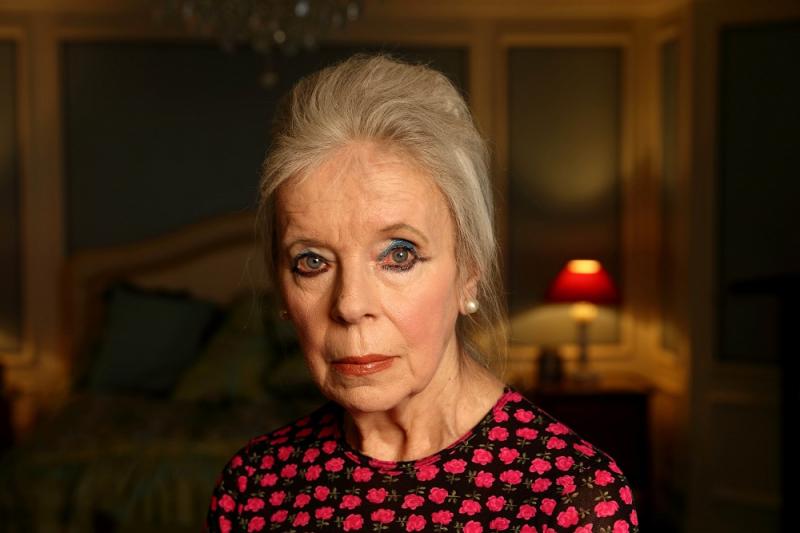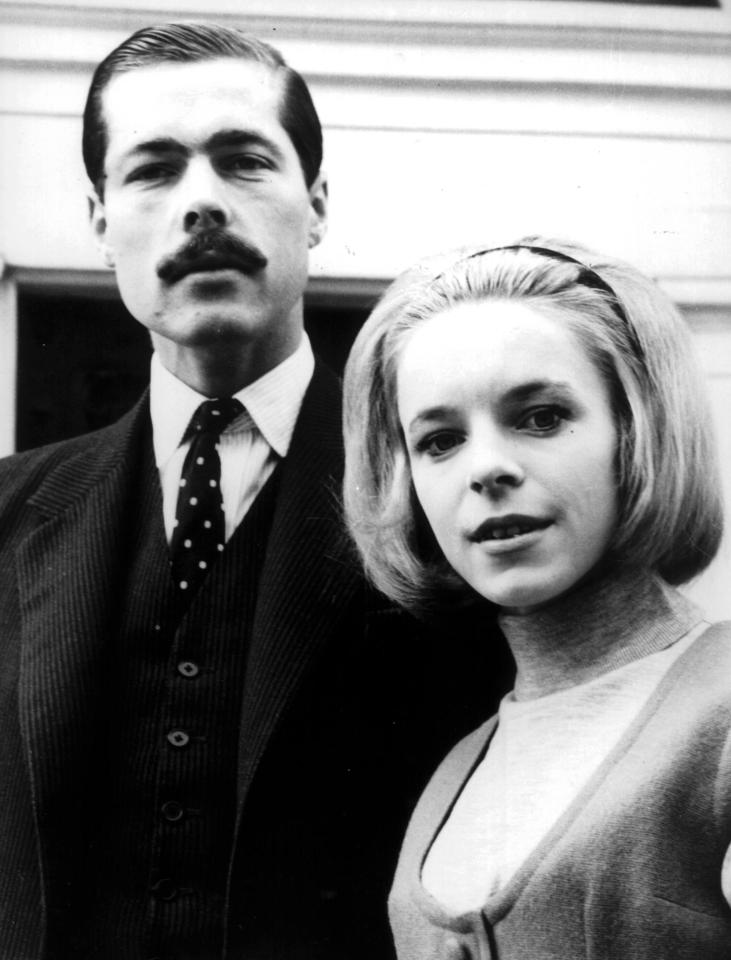Lord Lucan: My Husband, The Truth review - the coldest case of all | reviews, news & interviews
Lord Lucan: My Husband, The Truth review - the coldest case of all
Lord Lucan: My Husband, The Truth review - the coldest case of all
Extraordinary ITV interview with the missing earl's widow

Four years ago the BBC dramatised the story of the Lucans. Rory Kinnear donned the forthright moustache and Catherine McCormack played his spouse Veronica as a brittle victim of mental cruelty. The script speculated about the murder of the nanny Sandra Rivett using all the known sources. A year later Laura Thompson’s book A Different Class of Murder was published and last year the vanished earl’s death certificate was issued. That might have been thought to be that.
The portrait that emerged in Michael Waldman's documentary was of a pair of emotionally repressed snobs thrown together in a petridish, causing a calamitous chemical reaction. As a suitor the young Lucan made all the right moves and overcame the fears of those around his future wife - that he had socialist parents, was a professional gambler and “said to be queer.” The third of these slurs she was able to discount when he first drove her home and “carried me into the bedroom. Full stop.”
If Lady Lucan closed the bedroom door, she opened it again much later to remember the fearful canings her husband would administer to thrash her depression out of her. “Afterwards he would look regretfully at the damage he had caused.” Then he’d mount her. A shrink would have something to say about these proclivities. On holidays with his cine-camera he recorded plentiful footage of female posteriors in bikinis and had one image of his wife’s not in a bikini. Lady Lucan approved as she inspected the ghostly image of her naked young flesh.
What an appalling marriage it was. The wedding was “sparsely attended on both sides”, she recalled, for the simple reason that “neither of us was very popular”. This isn’t difficult to believe. For a wedding present Lucan's chum John Aspinall contemptuously gave the groom £200 to gamble in his club, correctly calculating that he'd get it all back with interest. With friends like that, who needs enemies? Lucan’s weakness, stupidity and pathetic need to live showily beyond his means is a matter of public record. His wife seems to have been brought up with similarly crippling assumptions about class and status. “To marry a peer of the realm was a coup on your part,” she clarified, and at the age of 26 she’d almost missed the boat. “You married me when you were old and grateful,” said Lucan callously. Then came the fraught business of providing him with an heir. “If you don’t have a son your reputation is in tatters,” she explained like a panicking spouse of Henry VIII, fearful of the execution block.
 When the three children came she mostly lay in bed and ignored them. “I could have been better,” she conceded. Nanny would take them to the seaside while the Lucans swanned off to Monte Carlo to play backgammon. Wasn’t that a bit cold? wondered Waldman. She briefly pondered the question. “All my relationships are cold,” she replied. Coldly.
When the three children came she mostly lay in bed and ignored them. “I could have been better,” she conceded. Nanny would take them to the seaside while the Lucans swanned off to Monte Carlo to play backgammon. Wasn’t that a bit cold? wondered Waldman. She briefly pondered the question. “All my relationships are cold,” she replied. Coldly.
Such a woman being proposed to by a handsome spendthrift peer was an appalling stroke of ill luck for both of them. They lived in silence. Lucan didn’t believe in talkative marriages. “You were both on your own in a strange sort of way,” she said. “He was on his own and I was on my own.” Even in a gondola.
In due course came the grim details of Lucan’s attempt to have her sectioned, to gain custody of the children, then the murder itself. His wife recalled her encounter with him on the stairs after he'd killed the nanny in the basement kitchen in forensic detail: the blows to the head, the gloved fingers rammed down her throat, her shrewd pretence at collusion as she attempted to save her own skin. “With your antagonist you will try and play on his psychology. I was concentrating with all my might on how to survive the situation.”
Survive she somehow has, but at a terrible cost. Now 79, for 35 years she has had no contact with her children. As if trapped into a time warp, she lives in a mews house around the corner from the old Lucan family home in Belgravia. How she missed out on bringing up a family remains a mystery to her, she said, that seems to gnaw far more than the wider mystery of her husband’s fate. (She briskly suggested he opted for death by ship’s propeller. “I mean, quite brave.”) Why she chose to speak now is also a mystery. Having no doubt often been told in childhood that big girls don’t cry, she didn’t break once. There was a brief gulp as she recalled laying a hand on the murder weapon wrapped in a bandage. Her lack of self-pity is at least admirable, though perhaps it is only a manifestation of detachment as a self-defence.
This was quite a coup for Waldman, who made his name 20 years ago with The House, the fly-on-the-wall series about the Royal Opera House in crisis, and is the most recent director of a feature-length documentary about the Queen. With more time, and perhaps a subject better adapted to self-analysis, there might have been deeper insights into mental health and spousal abuse. The interview was embellished with Lucan's home video footage on which posterity has conferred a ghoulish tint. The dramatic reconstructions felt unnecessary. The camera could and should have stayed on Veronica Lucan’s face, scoping it for chronic pain and profound depression. The only regret she would admit to was the death of Sandra Rivett. Murder was the greater crime, but one thing is clearer than ever: on that all too indelible night in 1974, Lord Lucan comprehensively destroyed his wife's life too.
rating
Explore topics
Share this article
Add comment
The future of Arts Journalism
You can stop theartsdesk.com closing!
We urgently need financing to survive. Our fundraising drive has thus far raised £49,000 but we need to reach £100,000 or we will be forced to close. Please contribute here: https://gofund.me/c3f6033d
And if you can forward this information to anyone who might assist, we’d be grateful.

Subscribe to theartsdesk.com
Thank you for continuing to read our work on theartsdesk.com. For unlimited access to every article in its entirety, including our archive of more than 15,000 pieces, we're asking for £5 per month or £40 per year. We feel it's a very good deal, and hope you do too.
To take a subscription now simply click here.
And if you're looking for that extra gift for a friend or family member, why not treat them to a theartsdesk.com gift subscription?
more TV
 theartsdesk Q&A: director Stefano Sollima on the relevance of true crime story 'The Monster of Florence'
The director of hit TV series 'Gomorrah' examines another dark dimension of Italian culture
theartsdesk Q&A: director Stefano Sollima on the relevance of true crime story 'The Monster of Florence'
The director of hit TV series 'Gomorrah' examines another dark dimension of Italian culture
 The Monster of Florence, Netflix review - dramatisation of notorious Italian serial killer mystery
Director Stefano Sollima's four-parter makes gruelling viewing
The Monster of Florence, Netflix review - dramatisation of notorious Italian serial killer mystery
Director Stefano Sollima's four-parter makes gruelling viewing
 The Diplomat, Season 3, Netflix review - Ambassador Kate Wyler becomes America's Second Lady
Soapy transatlantic political drama keeps the Special Relationship alive
The Diplomat, Season 3, Netflix review - Ambassador Kate Wyler becomes America's Second Lady
Soapy transatlantic political drama keeps the Special Relationship alive
 The Perfect Neighbor, Netflix review - Florida found-footage documentary is a harrowing watch
Sundance winner chronicles a death that should have been prevented
The Perfect Neighbor, Netflix review - Florida found-footage documentary is a harrowing watch
Sundance winner chronicles a death that should have been prevented
 Murder Before Evensong, Acorn TV review - death comes to the picturesque village of Champton
The Rev Richard Coles's sleuthing cleric hits the screen
Murder Before Evensong, Acorn TV review - death comes to the picturesque village of Champton
The Rev Richard Coles's sleuthing cleric hits the screen
 Black Rabbit, Netflix review - grime and punishment in New York City
Jude Law and Jason Bateman tread the thin line between love and hate
Black Rabbit, Netflix review - grime and punishment in New York City
Jude Law and Jason Bateman tread the thin line between love and hate
 The Hack, ITV review - plodding anatomy of twin UK scandals
Jack Thorne's skill can't disguise the bagginess of his double-headed material
The Hack, ITV review - plodding anatomy of twin UK scandals
Jack Thorne's skill can't disguise the bagginess of his double-headed material
 Slow Horses, Series 5, Apple TV+ review - terror, trauma and impeccable comic timing
Jackson Lamb's band of MI5 misfits continues to fascinate and amuse
Slow Horses, Series 5, Apple TV+ review - terror, trauma and impeccable comic timing
Jackson Lamb's band of MI5 misfits continues to fascinate and amuse
 Coldwater, ITV1 review - horror and black comedy in the Highlands
Superb cast lights up David Ireland's cunning thriller
Coldwater, ITV1 review - horror and black comedy in the Highlands
Superb cast lights up David Ireland's cunning thriller
 Blu-ray: The Sweeney - Series One
Influential and entertaining 1970s police drama, handsomely restored
Blu-ray: The Sweeney - Series One
Influential and entertaining 1970s police drama, handsomely restored
 I Fought the Law, ITVX review - how an 800-year-old law was challenged and changed
Sheridan Smith's raw performance dominates ITV's new docudrama about injustice
I Fought the Law, ITVX review - how an 800-year-old law was challenged and changed
Sheridan Smith's raw performance dominates ITV's new docudrama about injustice
 The Paper, Sky Max review - a spinoff of the US Office worth waiting 20 years for
Perfectly judged recycling of the original's key elements, with a star turn at its heart
The Paper, Sky Max review - a spinoff of the US Office worth waiting 20 years for
Perfectly judged recycling of the original's key elements, with a star turn at its heart

Comments
I didn't watch this as I felt
This sounds a terrible thing
Valuable as a look at the